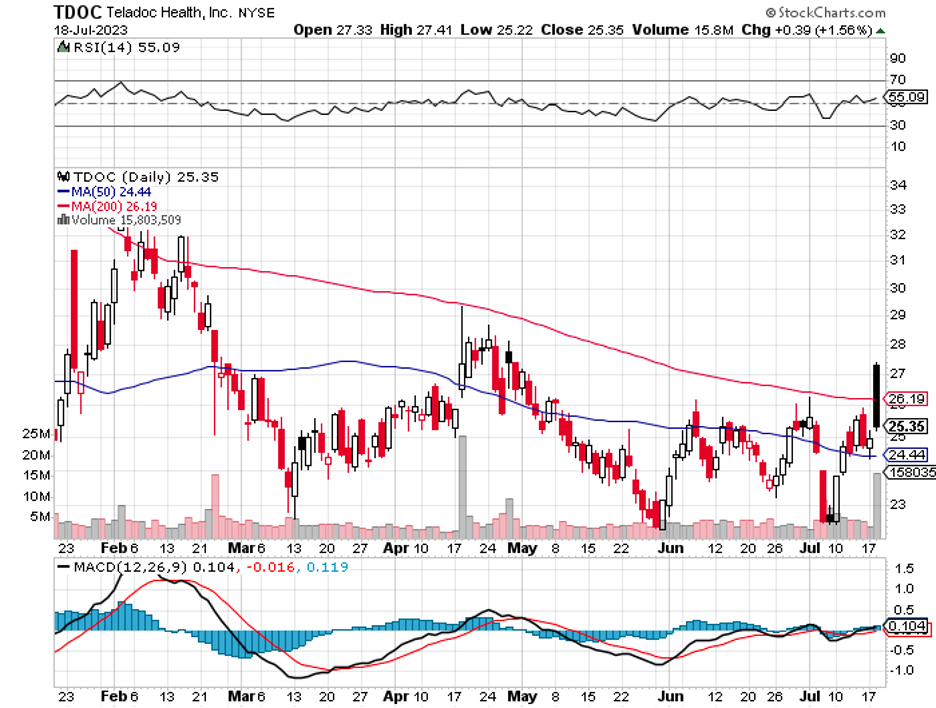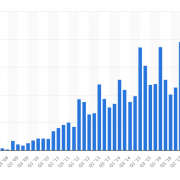Innovation Genius or Investors' Quagmire?
Let's rewind to the inception of Teladoc (TDOC).
In the early 2000s, online medical appointments were as futuristic as a scene out of The Jetsons. Fast forward to today, and Teladoc's business model - a digital clinic where you see the doctor from your laptop - is as commonplace as ordering a latte from your phone.
In theory, it's a genius innovation - cut down the rigmarole of office visits, boost doctor efficiency, and slash overhead costs associated with physical appointments.
Unfortunately, the real world has been a tough nut to crack for Teladoc, with investors getting cold feet over the past few years.
Still, when the risk-averse tide returned in 2023 and investors started making a beeline for stocks that had taken a beating in 2022, Teladoc shareholders were also banking on a swift recovery from the lows.
Indeed, with a market shift towards greener pastures, the stock got a nearly 60% leg-up from its historical lows by early February. It looked like buyers were of the view that, despite some managerial slip-ups, the leader of the telehealth market seemed underpriced given its double-digit growth rates. The expectations also seemed tempered.
Then came another slap of reality with the quarterly reports.
Despite respectable Q4 figures, the outlook was nothing short of a letdown. After a 2022 slump in the telehealth market and Teladoc's 18% growth, one might have hoped for a more robust expansion within a burgeoning industry.
Instead, investors got a projection of lukewarm average increase of just 8.4%, GAAP profitability seemed like a distant dream, and even an EBITDA growth of 22% couldn't make the numbers shine.
The backlash was predictable. After Q1 numbers, the stock rallied before it stumbled again, nearing its all-time lows - even amidst a risk-on climate.
Diminishing growth, elusive profitability, mounting competition – Is this Teladoc's swan song, or can it claw back its glory?
Recent updates show that it seems like Teladoc is leaning on Microsoft (MSFT) for a lifeline.
The company declared an expanded alliance with Microsoft, aiming to harness the latter's state-of-the-art artificial intelligence (AI) technology. This uplifting news is a much-needed antidote for the digital health provider, whose recent journey had more in common with a bear market trudge than a bull run sprint.
The idea is for the telehealth company to basically plug in the Azure OpenAI Service, along with other Microsoft products, directly into its homegrown Teladoc Solo virtual care platform.
The endgame? Cut the red tape for overworked healthcare professionals by automating the grind of clinical documentation – applicable to virtual check-ups and in-person consultations.
That's not all. Teladoc is additionally introducing the "Nuance Dragon Ambient eXperience," or DAX, a sophisticated tool that effortlessly transforms patient-practitioner dialogues into comprehensive, specialty-specific clinical notes, all while sticking to the letter of documentation standards.
As expected, the stock enjoyed an initial sugar rush as investors toasted to the company's pivot towards AI.
For me, though, I have a more measured take on the announcement. While I recognize the positive thrust of the move, I can’t completely agree that this alliance is a game-changer. Let me share some of the reasons behind my reluctance.
In the first part of 2023, Teladoc reported a top-line revenue of $629 million, while carrying a net loss of $69 million. On the surface, the balance between the top and bottom lines seems skewed.
However, taking a step back, Teladoc took a considerable hit last year with a sizeable goodwill impairment charge. But spring 2023 brings a new twist, with an $8.1 million expense for restructuring.
Based on the 10-Q filing, these costs were tied to "kissing goodbye to excess leased office spaces." We might assume this is a one-off, and quite frankly, it's a move I admire for a company currently in the red.
But let’s flip the script a bit and talk about operating expenses.
While the company managed to cut back on Sales and Technology and Development, they seemed to have thrown caution to the wind, with General and Administrative costs up by 9% and Advertising and Marketing expenses skyrocketing by 32%.
I’m not talking about an occasional splurge here. The 2022 report shows a 50% annual increase in Advertising and Marketing costs. This figure is critical, as it gives us a peek into the company's customer acquisition costs. More money spent on marketing translates to longer customer retention needed to turn a profit.
To provide you with a sense, for every dollar Teladoc made in Q1 2023, 28 cents went to marketing, a noticeable bump from 24 cents per dollar in Q1 2022.
Now, Teladoc hints at some seasonality in their operations, with the first and last quarters typically reflecting weaker operating income as the pace of new customer acquisitions and revenue growth lags behind marketing expenses. But let's not let this divert our attention from the discrepancy between revenue growth and marketing costs.
As an investor, you'd obviously want to know how well the company is retaining its customers with these rising acquisition costs.
Here's the deal: Teladoc's customer churn rate isn't increasing, but it's not dropping either. As for the customer retention rates, the company’s executives describe the figures as "stable."
Notably, the company already casts a wide net, claiming that "over 80 million individuals in the U.S. have access to one or more of our products and services." If that's true, Teladoc already has its hooks in nearly a quarter of the U.S. population.
So, the million-dollar question for investors: If Teladoc can't turn a profit with this massive reach, then when will it?
In the digital healthcare universe, Teladoc once promised to be a shooting star. Yet, amidst stalled growth, daunting losses, and controversial investments, it appears more like a black hole absorbing investor optimism.
The recent alliance with Microsoft injects a ray of hope, aiming to automate and optimize operations through AI. But the questions remain: Is this the life-saving maneuver that rights Teladoc's trajectory, or just a brief flash in the pan?
As investors, we're left to wonder, in the dance of innovation and investment, will Teladoc waltz or wobble? Only time will play the music.



